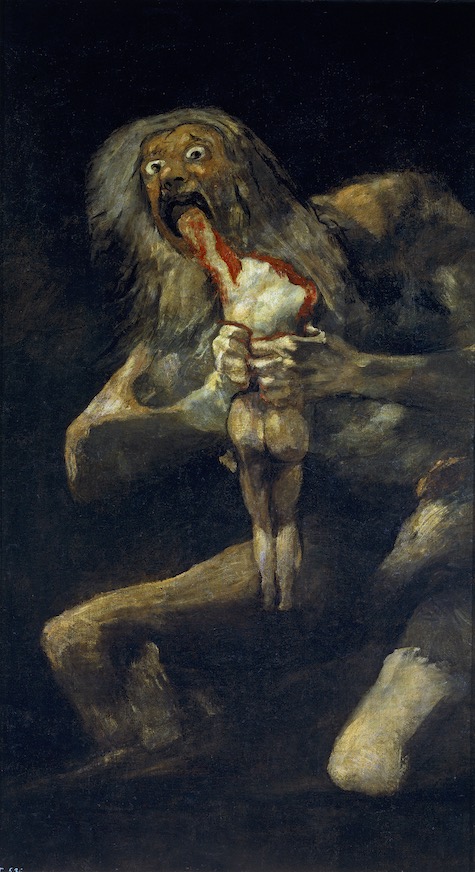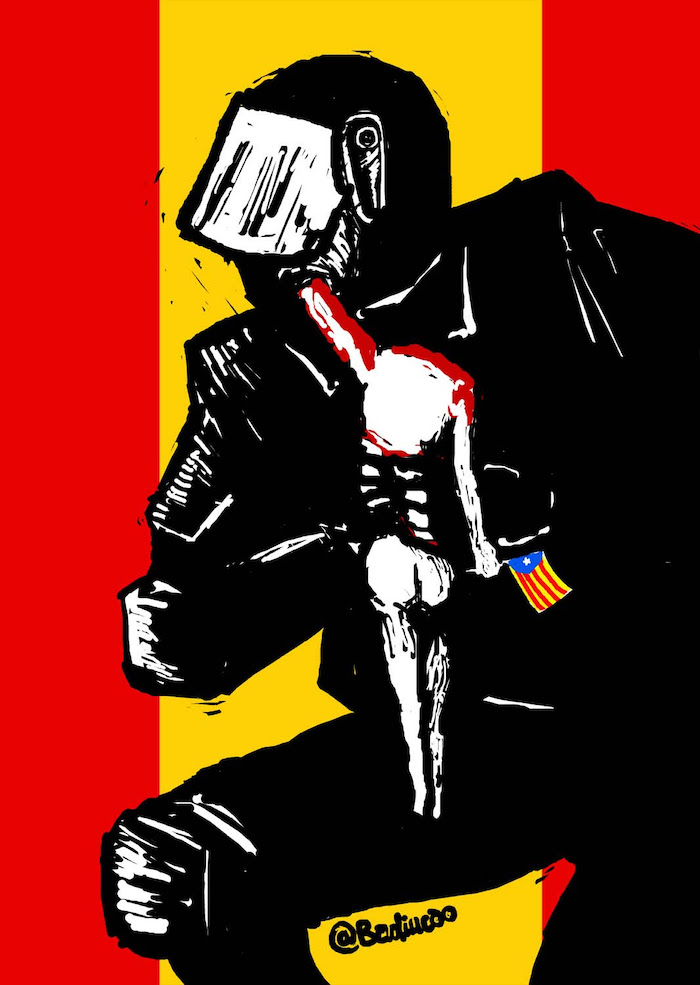Saturn < Cronus (Κρόνος) ≠ Chronos (Χρόνος)
« previous post | next post »
[This is a guest post by Jichang Lulu, with some minor modifications and additions by VHM]
You might have seen this — the PRC embassy in Poland has given Badiucao's forthcoming exhibition in Warsaw (coorganised by Sinopsis) some very welcome, completely unexpected publicity by trying to have it shut down. Lots of international reporting:
The Guardian, Sydney Morning Herald, &c., &c.
The ‘cannibalistic’ theme (picture below [with Badiucao standing next to the poster featuring his art] via the Sydney Morning Herald):
of course alludes to Cronus eating his sons, as in Hesiod:
καὶ τοὺς μὲν κατέπινε μέγας Κρόνος, ὥς τισ ἕκαστος
νηδύος ἐξ ἱερῆς μητρὸς πρὸς γούναθ' ἵκοιτο,
τὰ φρονέων, ἵνα μή τις ἀγαυῶν Οὐρανιώνων
ἄλλος ἐν ἀθανάτοισιν ἔχοι βασιληίδα τιμήν.
— or as in the recent-ish verse translation by Schlegel and Weinfeld:
But these the mighty Kronos swallowed up as soon as from
Out of their mother's holy womb each toward her knees would come,
Deeming that no one else but he, of those who dwell on high,
Should hold the rank of king among the gods who never die.
— which is remarkably literal: the two arguable licenses (the insertion of ‘gods’ and ’those who dwell on high’ for the original ~‘the Sky's noble descendants’) cancel each other, as it were, to the extent they let one nitpick at all.
The same passage in Schirnding's also fairly literal hexameters, for the lulz of it:
Alle verschlang sie der mächtige Kronos, kaum daß ein jeder
aus der heiligen Mutter Schoß seinen Knien genaht war.
Keiner, so sann er, von allen erhabenen Uranionen
sollte unter den Göttern die Königswürde besitzen.
Yummy at the moment perhaps, but it doesn't end up terribly well for Cronus, which is presumably why the embassy didn't appreciate it. Ironic isn't it, since one could say Xi himself has his own rhymed version of the passage, for which see the remarkable Rubao Remix in this post, "Xiist music" (2/25/20 — with a lengthy bibliography focusing on Xi's linguistic gaffes):
chībǎo le méishì gàn,
qiánsuǒwèiyǒu de tiǎozhàn!
shān zàigāo ,wǎngshàng pān,
jīnhòu dōuděi lā qīngdān。
吃饱了没事干,
前所未有的挑战!
山再高,往上攀,
今后都得拉清单。
"eating too much then idle around
an unprecedented challenge
the mountain is high, continue to climb
someday you will all be liquidated"
(translation from the subtitles)
Detail from the poster:
What's going on here?
At first I thought he was biting into a rat's head attached to a duck's neck, all cloaked in white, but then I realized that Badiucao's theme here is based on Francisco Goya's (1746-1828) famous "Saturn Devouring His Son":

(source)
The play on Goya's painting has been a common theme in Badiucao's work for some time. In 2017 the allusion to Goya was clearer, as seen in his "Self-determination for Catalonia":

Original caption: The painting Saturn by the Spanish artist Goya.
Cartoon: Badiucao.
As seen through this link, Goya himself made an earlier drawing on the same theme — Time devouring men, thus explicitly following the common (folk-etymological) connection of Saturn / Cronus (Κρόνος) to Chronos (Χρόνος).
Selected readings
- "Is it a rat's head or a duck's neck?" (6/12/23)
- "Mubarak's poodle" (2/12/11)
- "ChiNAZI" (8/27/19)


Scott P. said,
June 18, 2023 @ 11:03 am
Erwin Panofsky discusses this in his analysis of the iconology of Father Time, whose imagery derives in part from earlier images of Saturn/Kronos.
Olaf Zimmermann said,
June 18, 2023 @ 1:29 pm
Concerning Kronos/Chronos:
« N'est-il donc pas à craindre que la révolution, comme Saturne, dévorant successivement ses enfants, n'engendre enfin le despotisme et les calamités qui l'accompagnent ! »
(Vergniaud, March 13, 1793, Archives Parlementaires, LX, p.162)
Paul Frank said,
June 18, 2023 @ 10:51 pm
Lu Xun's Madman's Diary (狂人日記) ends with the wrods: "Are there children who have not yet eaten human flesh? Save the children… (沒有吃過人的孩子,或者還有?救救孩子!)".
And Daniel Ellsberg wrote:
"I sat there alone for more than an hour without getting up, my head sometimes tilted back against the wall, sometimes in my hands, without stopping to shake from my sobbing. I had never cried like this before except, more briefly, when I learned that Bobby Kennedy was dead. A line kept repeating itself in my head: We are eating our young. I had not been ready to hear what Randy had said. I had not been braced for it. When he mentioned his friends who were in prison and remarked that he would soon be joining them, it had taken me several moments to grasp what he had just said. Then it was as though an ax had split my head, and my heart broke open. But what had really happened was that my life had split in two. We are eating our young, I thought again, sitting on the floor of the men’s room in the second part of my life." Daniel Ellsberg, Secrets: A Memoir of Vietnam and the Pentagon Papers, Penguin Publishing Group, 2003, p. 272.
chris said,
June 19, 2023 @ 2:32 am
In English the potential for confusion is heightened by the fact that there is no proper chi sound so "Chronos" is also pronounced with a sound more typically associated with "k" (as are many other chi words from Greek, including "Christ" and its derivatives). They aren't homophones in Greek, I don't think. (Or does that depend on dialect?)
Are people whose native languages distinguish those consonants less likely to confuse Cronos with Chronos?
Philip Anderson said,
June 19, 2023 @ 7:14 am
@chris
The pronunciation of chi changed over time in Greek, but I don’t think it has ever been a homophone of kappa _in Greek_; the Modern Greek letter is usually transliterated as ‘h’.
Welsh distinguishes between ‘c’ (/k/) and ‘ch’, but many originally Greek words with chi appear with ’c’, having been borrowed phonetically from Latin (eg Crist) or English (eg cronomedr). However, Achilles is apparently “Echel, Achil, Achiles”, which I would pronounce with a fricative, not a stop.
Jichang Lulu said,
June 19, 2023 @ 9:41 am
As Philip Anderson says, kappa and chi did and do represent separate sounds in Greek. In Ancient (enough) Greek, χ was [kh] (~cull), κ was [k] (~skull). In Modern, χ (in that position) is [x] (~ loch), κ stays the same. These were and remain different consonants, but the similarity in sound was surely obvious. Awareness of their similarity was perhaps reinforced by the fact that they were also connected by phonological processes that made them alternate — e.g. χαίρω ‘I rejoice (etc.)’, κεχάρηκα ‘I have rejoiced; I am glad’ (cf., e.g., Eucharist).
German and Russian are examples of languages that, unlike Welsh, generally preserve the distinction in pronunciation between χ and κ in Greek loandwords (e.g., Хронос, Кронос). The other extreme are languages, like Italian and Spanish, that don’t just collapse χ and κ in their pronunciation of Greek loanwords but also in spelling. In Spanish, Portuguese, Catalan and others, this combines with Romance prothetic e- to yield, e.g., escatología meaning both ‘eschatology’ and ‘scatology’.
This is, however, ultimately irrelevant to the folk-etymological association of Cronus and Chronos, since that happened already in Ancient Greek. Several classical authors refer to the connection. Panofsky, whom Scott P. cites above (pp. 73ff., conveniently gives a few these starting from Plutarch introducing a discussion of the history of Saturn as Time in later iconography. One Panofsky doesn’t seem to cite is Cicero, who says in Book 2 of De natura deorum that the two Greek names are ‘the same’ (even though, in Classical Latin, ch as in Greek loanwords was normatively supposed to be aspirated, and Cicero of course spoke Greek). As a bonus, Saturn gets etymologised as ‘saturated [with years]’.
Panofsky is also a convenient source listing earlier paedophagus Saturns than Goya’s: Rubens’s (1636–1638) and Caraglio’s (1526, after Rosso Fiorentino). Caraglio's career ended in Poland, where Badiucao’s Cronus now is.
Rodger C said,
June 19, 2023 @ 9:42 am
IIRC Kronos = Khronos originated among Hellenistic scholiasts as a deliberate pun.
Jichang Lulu said,
June 19, 2023 @ 9:43 am
) — unmatched parenthesis before the Panofsky page numbers, for which all due apologies.
Olaf Zimmermann said,
June 19, 2023 @ 10:31 am
Apologies – that should have read « n'engendrât » …
which I hope clarifies things a little. The phrase was reused, albeit in simplified form, by Büchner (1835) in his 'Dantons Tod' – where Danton says „Ich weiß wohl — die Revolution ist wie Saturn, sie frißt ihre eigenen Kinder"; Vajda's (Danton, 1983) reprise was 'La Révolution est comme Saturne, elle dévore successivement ses propres enfants.' It must have been well-known at the time – how else could Goya have alluded to it?
(This being sa[i]d: Neither an Engelsian nor a Spenglerian be!)
Later we get (vox populi) „Die Revolution frißt ihre Kinder", followed by „Die Revolution entläßt ihre Kinder". Whorf's the matter – from Ortsgeist to Zeitgeist – genius loci (a debateable concept at the best of times) to genius saeculi – il n'y a qu'un pas.
@VMH Thanks for bringing up Schirnding (Albert von) – the Ludwigsgymnasium was, in them there days [if memory serves], one of the better 'Gymnasien' in Munich.
Jichang Lulu said,
June 19, 2023 @ 12:29 pm
I thought I should elucidate the Xi rap stanza.
Settings of politicians’ infelicities surely abound online (e.g., of former Hungarian PM Gyurcsány’s claim that ‘the largest two-digit prime is 11’, which is true in binary). The Rubao remix in ‘Xiist music’ is more sophisticated. Not only is it mostly made of famous, and often mocked, Xiisms, some of which Professor Mair has discussed on LL; it has non-trivial rhyme and metre, and makes some sort of sense.
The quoted stanza parallels the Cronus myth: like Cronus (who, fearing potential rivals, castrated his father Uranus and ate his own sons, then was made to regurgitate them and imprisoned), a full-bellied Xi goes for what is on high [his predecessors?]; the time of reckoning will come.
Xi, who then honchoed the CCP Secretariat, said this in 2009 while visiting Mexico. Reuters translates: ‘foreigners with full bellies and nothing better to do’ who criticise the PRC government.
is unremarkable — a common idiom Xi has used multiple times.
‘…and you’ll reach the summit’ (总能登顶). Xi seems to have said this a couple of times, notably at the first meeting of the National People’s Congress in 2018. There’s also a widely hyped ‘two-mountain doctrine’ of his but I’m not sure there’s a connection.
Xi uttered a version of this at the CCP’s 2014 Central Political and Legal Work Conference, probably referring to Zhou Yongkang, a honcho formerly in charge of such Work who was getting purged at that time. Barmé (‘The Threnody of Tedium’, China Heritage, 18 February 2022) explains:
Olaf Zimmermann said,
June 19, 2023 @ 5:48 pm
@Jichang Lulu :
You are diminishing your point – how a recurrent theme (dare I say 'motif' ?) worked its way from antiquity to the present day, across "cultures" (whatever that may be), languages, and manner of representation (linguistic/rhetorical/pictorial), all the while exposing the weakness of those who assert their legitimacy by oppressing dissent – by labouring it.
Many of the examples you provide are hilarious – if they weren't so sad – but I am always reminded of Peter Cook's remark about “those wonderful Berlin cabarets which did so much to stop the rise of Hitler and prevent the outbreak of the Second World War”.
Taylor, Philip said,
June 20, 2023 @ 2:24 am
With respect, Olaf, I feel that Jichang Lulu is neither diminishing his point nor is he labouring it. I found the many examples that he adduced both interesting and informative. But I remain puzzled by the quotation from Daniel Ellsberg by Paul Frank — who was "Randy", why was he about to go to prison (and why were his friends already there), and how exactly were "[were] we […] eating our young" ? By sending them to die in Vietnam, by incarcerating them for protesting against the American war in Vietnam, or in some other way that I have failed to comprehend ?
Victor Mair said,
June 21, 2023 @ 7:55 am
China Tries to Cancel Badiucao’s Art Show in Poland
The effort backfired, stiffening the spine of Australian officials.
by Jillian Kay Melchior, WSJ (6/20/23)
https://www.wsj.com/articles/china-tries-to-cancel-an-art-show-in-poland-badiucao-repression-diplomat-australia-2ef4f1f3
Elizabeth Barber said,
June 23, 2023 @ 5:16 pm
I find the age-old equation of Kronos with both Khronos (Time) and Saturn interesting, because of the astronomy involved. Saturn is the visible planet with the longest orbit, therefore he/it was regarded as the "eldest" AND THE MEASURER OF TIME. In Homer's bawdy song (actually, good astronomy) in the Odyssey, Aphrodite/Venus hopped in bed with Ares/Mars, was seen by Helios at sunrise, who tipped off her husband Hephaistos (the inventor-god), who in turn captured them and held them in bed with an "unbreakable net" while the other male gods (Zeus/Jupiter, Hermes/Mercury, and Poseidon–the eldest Olympian god, hence representing the PLANET we now call Saturn) came around and laughed at them! It is elderly Poseidon who finally orders Hephaistos to let them go, after they promise never to do it again. And they haven't! This tale records a very rare conjunction of all 5 visible planets, visible in Greece at dawn during February of 1953 BCE. Homer not only accurately passes on real events from well over a millennium before his time, but he demonstrates that the association between the planet Saturn and the measurement of Time (Khronos) already existed 4000 years ago. (References available if wanted.)